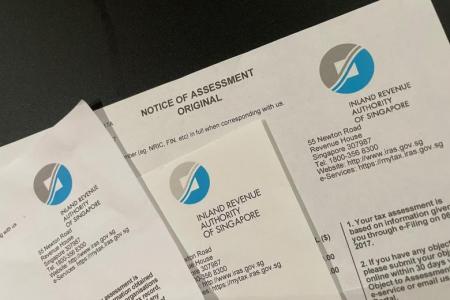Tax filing time: Make sure you get relief claims right
More than 80,000 additional tax bills were issued to personal income taxpayers in 2021 after incorrect tax relief claims were withdrawn.
These additional taxes totalled $36.7 million, according to the Inland Revenue Authority of Singapore (Iras).
The filing season for personal income tax returns has begun. People have until April 18 to e-file their tax returns for year of assessment 2022 for income earned in 2021.
Generally, most taxpayers will receive their bills from the end of April.
Here are some tips for filing your personal income taxes.
1. Claiming tax reliefs
Taxpayers should check if they meet the conditions for tax reliefs before entering their claims in the tax forms.
For first-timers filing taxes, the reliefs are not pre-filled in the returns.
Meanwhile, those who have filed income taxes in the past should not assume that they are eligible for the same reliefs every year. This is because they may no longer qualify for some of the reliefs, or qualify for other reliefs which were not previously available to them.
The tax form on Iras' myTax Portal is pre-filled based on tax reliefs granted in the previous year, and taxpayers are responsible for checking if the reliefs still apply.
Making wrongful claims of tax reliefs is an offence and penalties may be imposed.
Taxpayers can use the checker on the Iras website to ascertain their eligibility for tax reliefs.
The top three tax reliefs wrongly claimed in 2021 were child relief (54.8 per cent of wrongful claims), parent relief (32.8 per cent) and spouse relief (10.4 per cent).
Besides claims where taxpayers did not meet the qualifying conditions, some erroneous claims were also due to duplicate claims made on the same dependant.
Certain tax reliefs, such as parent relief, child relief and handicapped sibling relief, can be claimed by one taxpayer or shared among taxpayers who supported the dependant.
In the case of the latter, each taxpayer should claim only a proportion of the full relief amount.
2. Filing and/or verifying employment income
Taxpayers whose employers are under the auto-inclusion scheme may receive a notification telling them that they are on the no-filing service.
They need to verify if the auto-included employment income and reliefs are correct. They do not need to file a tax return unless they are making changes to the auto-filled information.
Those with incorrect auto-included employment income should check with their employers so that the information can be rectified.
Individuals whose employers are not under the auto-inclusion scheme must report their employment income when filing their tax returns.
Taxpayers can visit the Iras website to check if their employers are on the scheme.
3. Filing and/or verifying rental income and expenses
Rental income from the letting or subletting of property is taxable on a net basis, after deducting allowable expenses.
Such income is typically pre-filled based on information reported in the previous year and/or Iras' e-Stamping records.
If taxpayers have received higher rent than the previous year's, they should make the necessary changes when filing their tax returns.
Those who rented out property for only part of the year, instead of the whole year, should adjust the rental period and report the rental income received for the period accordingly.
Expenses which can be deducted against rental income when filing tax returns include those incurred for repair, insurance, and maintenance or upkeep of a rental property, as well as property tax and mortgage interest.
With effect from year of assessment 2022, allowable expenses include agents' commission fees, advertising and legal expenses, and stamp duties that taxpayers have incurred in obtaining, granting, renewing or extending a lease to their first tenant.
Expenses that cannot be deducted against rental income include renovation and furnishing costs, as well as repayments of the property loan principal.
Get The New Paper on your phone with the free TNP app. Download from the Apple App Store or Google Play Store now


